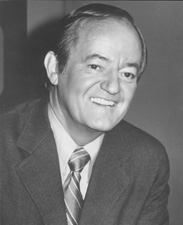Hubert H. Humphrey
From dKosopedia
Categories: Minnesota Democrats | Vice Presidents of the United States | Presidential candidates
| Hubert Horatio Humphrey | |
|---|---|
| Vice President | |

| |
| Party | Democratic-Farmer-Labor |
| January 20, 1965 — January 20, 1969 | |
| Preceded by | Lyndon B. Johnson |
| Succeeded by | Spiro Agnew |
| Birthdate | May 27, 1911 |
Hubert Horatio Humphrey was born in South Dakota in (May 27, 1911, Humphrey first gained political office as mayor of Minneapolis in 1945. After the defeat of the Farmer-Labor party in the late 1930's Minnesota underwent a period of GOP domination. This changed when Humphrey helped unite the Democrats with the Farmer-Labor party, creating the Democratic-Farmer-Labor party. Humphrey ran and won his first Senate term in 1948. Humphrey gave a stirring speech in favor of a strong civil rights plank in the Democratic platform during the 1948 Democratic National Convention, causing many southern delegates to walk out in protest. However, Humphrey was successful in getting a strong civil rights plank in the party platform.
During his senatorial career Humphrey was regarded as one of the most liberal members of the senate and worked for housing, social welfare and civil rights. During this time Humphrey cultivated a close relationship with then Senate Majority Leader Lyndon Johnson. In 1964 Johnson asked Humphrey to be the Vice Presidential nominee. Even though Humphrey gained respect for his committment for civil rights and was together with Ralph Yarborough one of the thriving forces behind the Great Society [1] [2], he was often critized for his vocal support for the Vietnam War.
After serving as VP Humphrey became the Democratic candidate in the fateful 1968 campaign. Despite not clinching the party nomination until summer, and campaigning during a year when the New Deal coalition was coming apart at the seems, due to Nixon’s race driven “Southern Strategy”. Humphrey nearly won the White House, but lost to Nixon in one of the closest elections in history. Humphrey closed a 20+ deficit (according to summer polling data) to 1% in the popular vote, but ultimately lost to Nixon.
After the election Humphrey returned to Minnesota and won another term in the senate in 1971. He died on January 13, 1978 of cancer, and his wife was appointed to serve out the remainder of his term.
![[Main Page]](../../../../upload/banner-blue-135.jpg)